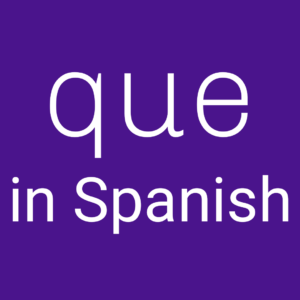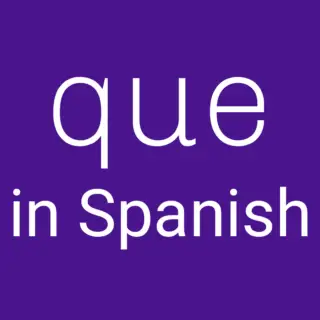How do you use Que in Spanish?

When to Use Que in Wikipedia“>Spanish?
Relative pronouns are pronouns that are used to introduce a clause that provides more information about a noun. Thus in the phrase “the man who is singing,” the relative pronoun is “who”; the clause “who is singing” provides further information about the noun “man.” In the Spanish equivalent, el hombre que canta, the relative pronoun is queue.
Que Tops List of Spanish Relative Pronouns
Common relative pronouns in English include “that,” “which,” “who,” “whom” and “whose” (although these words also have other uses). In Spanish, by far the most common relative pronoun is que.
As can be seen in the following sentences, it usually means “that,” “which” or “who.”
Los libros que son importantes en nuestra vida son todos aquellos que nos hacen ser mejores, que nos enseñan a superarnos. (The books that are important in our lives are all those that make us be better, which teach us to improve ourselves.)
Compré el coche en que íbamos. (I bought the car in which we rode.)
El politeísmo es la creencia de que hay muchos dioses. (Polytheism is the belief that there are many gods.)
Mi hermano es el hombre que salió. (My brother is the man who left.)
In some cases, que isn’t translated as a relative pronoun in English because the two languages structure the sentence differently:
Necesitamos la firma de la persona que ayuda al paciente. (We need the name of the person helping the patient.)
No conozco a la niña que duerme en la cama. (I don’t know the girl sleeping in the bed.)
Other Relative Pronouns
If you’re a beginning Spanish student, you likely won’t need to use the other relative pronouns of Spanish, but you certainly will come across them in writing and speech. Here they are with examples of their usage:
– quien, quienes — who, whom — A common mistake by English speakers is to use quien when que should be used. Quien is most commonly used following a preposition, as in the first example below. It can also be used in what grammarians call a nonrestrictive clause, one separated by commas from the noun it describes, as in the second example. In that second example, que also could be used instead of quien.
Es el médico de quien le dije. (He is the doctor whom I told you about.)
Conozco a Sofía, quien tiene dos coches. (I know Sophia, who has two cars.)
– el cual, la cual, lo cual, los cuales, las cuales — which, who, whom — This pronoun phrase must match the noun it refers to in both number and gender. It is used in formal writing more often than in speech.
Rebeca es la mujer con la cual vas a viajar. (Rebeca is the woman with whom you are going to travel.)
Conozca los principales riesgos a los cuales se enfrentan las organizaciones en la era digital. (Know the main risks which organizations are facing in the digital age.)
– el que, la que, lo que, los que, las que — which, who, whom — This pronoun phrase must match the noun it refers to in both number and gender. It is often interchangeable with el cual but is somewhat more informal in usage.
Rebeca es la mujer con la que vas a viajar. (Rebeca is the woman with whom you are going to travel.)
Hay un restaurante en los que los meseros son robots. (There is a restaurant in which the waiters are robots.)
– cuyo, cuya, cuyos, cuyas — whose — This pronoun functions something like an adjective and must match the noun it modifies in both number and gender. It is used more in writing than in speech. It normally isn’t used in questions, where de quién is used instead, as in ¿De quién es esta computadora? for “Whose computer is this?”
Es la profesora cuyo hijo tiene el coche. (She is the teacher whose son has the car.)
El virus se autodistribuye a los contactos del usuario cuya computadora ha sido infectada. (The virus spreads itself to the contacts of the user whosecomputer has been infected.)
– donde — where — The Spanish and English words as relative pronouns are used in much the same way.
Voy al mercado donde se venden manzanas. (I’m going to the market where apples are sold.)
En la ciudad donde nosotros vivimos existen muchas iglesias. (There are many churches in the city where we live.)
Sentences with the word que in Spanish
| ¿Sabías que Tina y Hector se dejaron? | – | Did you know that Tina and Hector left? |
| ¡Que piernas tan largas tienes! | – | What long legs you have! |
| Que casa más bonita. | – | What a beautiful house. |
| Hola, qué tal la fiesta. | – | Hello, how was the party? |
| Es que necesitaba hablar contigo. | – | I just needed to talk to you. |
| Espera que ya te recojo en la escuela. | – | Wait I’ll pick you up at school. |
| Cuando quieras que te respeten, empieza respetando a los demás. | – | When you want to be respected, she starts by respecting others. |
| Es un poco peor que el tratado de paz. | – | It’s a little worse than the peace treaty. |
| Les sugiero qué escuchen lo que tengo que decir. | – | I suggest you listen to what I have to say. |
| Admito que personalmente prefería el plato de ensalada. | – | I admit that she personally preferred the salad plate. |
| Estos países observan lo que ocurre en la guerra. | – | These countries watch what happens in war. |
| Por lo que respecta al código, me he pronunciado a favor. | – | As for the code, I have spoken in favor. |
| Es evidente que goza de amplia aprobación. | – | Clearly it enjoys wide approval. |
| No aceptamos que se nos cuestione sin razones. | – | We do not accept being questioned without reason. |
| Hay que tener reservas mínimas, esa es mi opinión. | – | You have to have minimum reservations, that’s my opinion. |
| Es una tradición que no se puede perder. | – | It is a tradition that cannot be lost. |
| Por tanto, supongo que el parlamento lo votará ahora. | – | So I assume that Parliament will vote on it now. |
| Estoy seguro que tendremos buenos resultados al final de la jornada. | – | I am sure we will have good results at the end of the day. |
| No tenemos tiempo que perder. | – | No time to lose. |
| Es una pena que no pueda asistir a la conferencia de Bruselas. | – | It is a pity that he cannot attend the conference in Brussels. |
| Sería mejor que las solicitudes se presenten en la Academia. | – | It would be better if applications are submitted to the Academy. |
| Encontré una carta y decía que no quería sufrir más. | – | I found a letter and it said that I didn’t want to suffer anymore. |
| Hay que pagar los impuestos. | – | Taxes must be paid. |
| Hubo casos en los que se evitaron mayores costos. | – | There were cases where higher costs were avoided. |
| Hay que tener una doble mirada, a lo bueno y lo malo. | – | You have to have a double look, to the good and the bad. |
| Tenemos que tener cuidado para no averiar el sistema de audio. | – | We have to be careful not to damage the audio system. |
| La venta es un arte que hay que desarrollar. | – | Selling is an art that must be developed. |
| Hay que ver la película, es un intento de buen cine. | – | You have to see the movie, it’s an attempt at good cinema. |
| No pudimos inscribirnos ya que la fecha tope había expirado. | – | We were unable to sign up as the deadline had passed. |
| Ellos fueron detenidos, ya que protestaban por la subida de impuestos de energía. | – | They were arrested as they were protesting the rise in energy taxes. |

Leave a Reply
You must be logged in to post a comment.